Unit5 Amazing things 单元复习课件(30张PPT+内嵌音视频素材)
文档属性
| 名称 | Unit5 Amazing things 单元复习课件(30张PPT+内嵌音视频素材) |  | |
| 格式 | pptx | ||
| 文件大小 | 29.2MB | ||
| 资源类型 | 教案 | ||
| 版本资源 | 牛津译林版 | ||
| 科目 | 英语 | ||
| 更新时间 | 2022-05-21 22:37:51 | ||
图片预览

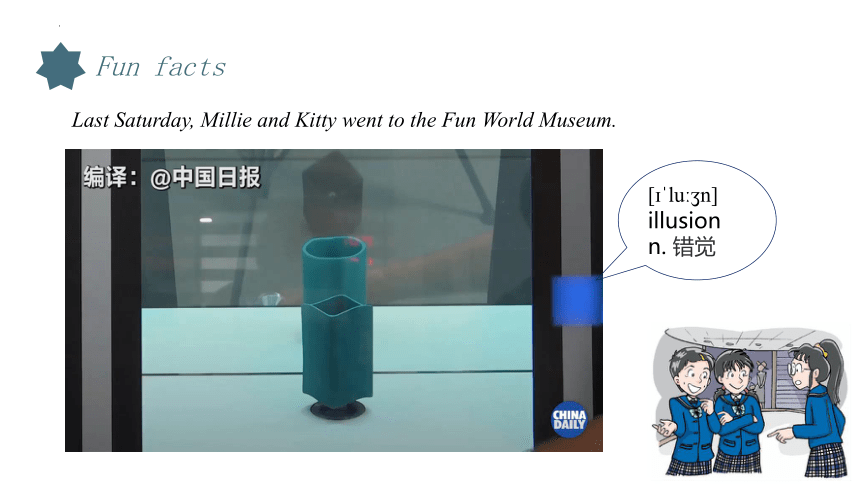
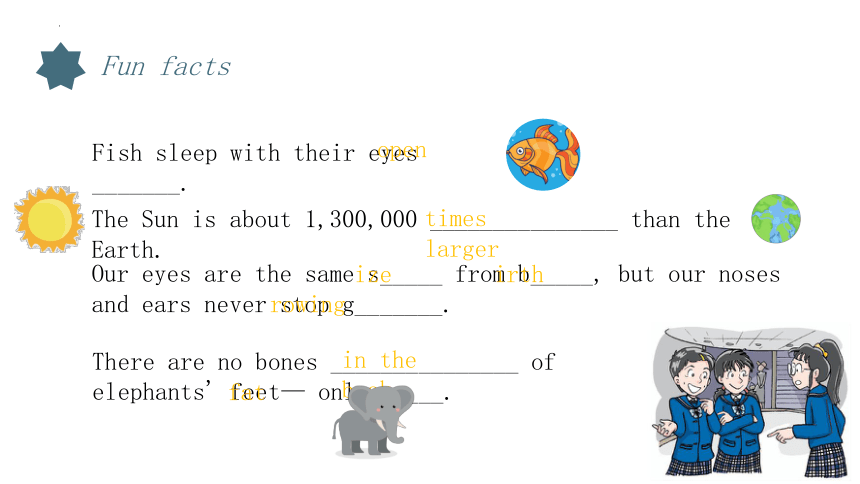

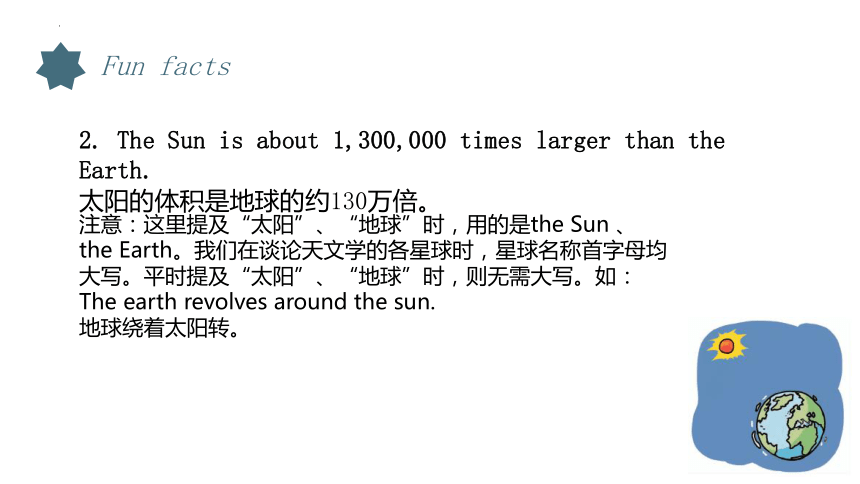
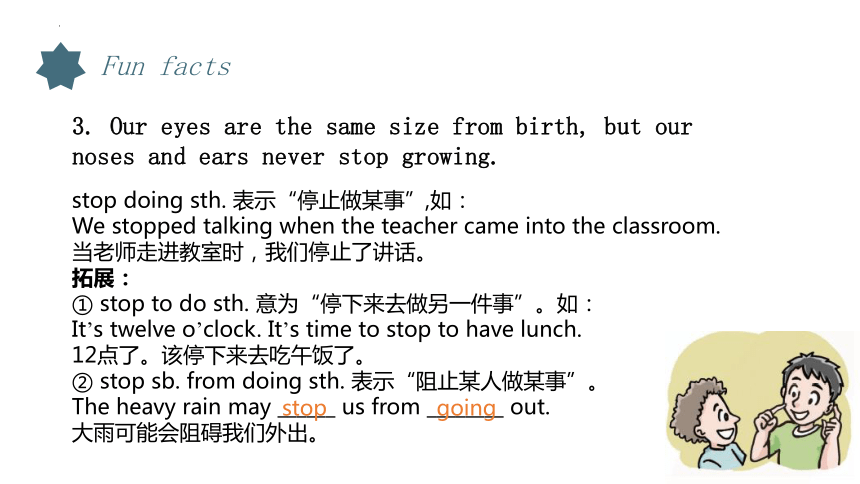
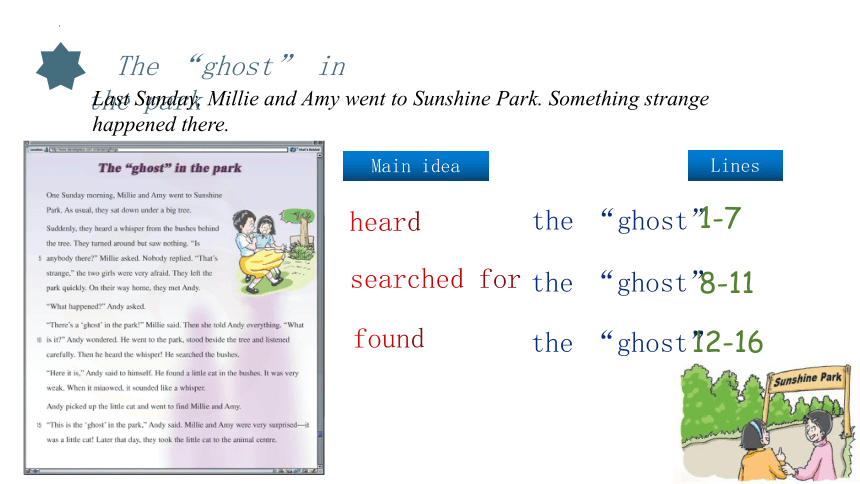





文档简介
(共30张PPT)
7B Unit 5
Revision
Fun facts
Last Saturday, Millie and Kitty went to the Fun World Museum.
[ lu n]
illusion
n. 错觉
Fun facts
The Sun is about 1,300,000 _______________ than the Earth.
times larger
Our eyes are the same s_____ from b_____, but our noses and ears never stop g_______.
ize
irth
rowing
Fish sleep with their eyes _______.
open
There are no bones _______________ of elephants' feet— only _____.
in the back
fat
1. Fish sleep with their eyes open.
“with+名词+形容词/介词短语”在句中作状语。如:
他喜欢开着窗子睡觉。
He likes to sleep ____________________________.
我们的英语老师手里拿着一本书走进教室。
Our English teacher came into the classroom ___________________________.
Fun facts
with the window open
with a book in her hand
2. The Sun is about 1,300,000 times larger than the Earth.
太阳的体积是地球的约130万倍。
注意:这里提及“太阳”、“地球”时,用的是the Sun 、the Earth。我们在谈论天文学的各星球时,星球名称首字母均大写。平时提及“太阳”、“地球”时,则无需大写。如:
The earth revolves around the sun.
地球绕着太阳转。
Fun facts
3. Our eyes are the same size from birth, but our noses and ears never stop growing.
stop doing sth. 表示“停止做某事”,如:
We stopped talking when the teacher came into the classroom.
当老师走进教室时,我们停止了讲话。
拓展:
① stop to do sth. 意为“停下来去做另一件事”。如:
It’s twelve o’clock. It’s time to stop to have lunch.
12点了。该停下来去吃午饭了。
② stop sb. from doing sth. 表示“阻止某人做某事”。
The heavy rain may ______ us from ________ out.
大雨可能会阻碍我们外出。
going
stop
Fun facts
The “ghost” in the park
Main idea
Lines
the “ghost”
heard
searched for
found
8-11
12-16
1-7
the “ghost”
the “ghost”
Last Sunday, Millie and Amy went to Sunshine Park. Something strange happened there.
The “ghost” in the park
When
Where
What
How
Who
The “ghost” in the park
When
Where
What
happened suddenly
How
did it happen
did it happen
did they feel
One Sunday morning.
In Sunshine Park.
They heard a whisper from the bushes.
They were very afraid.
Who
were they
Millie and Amy.
The “ghost” in the park
As usual, they sat down under a big tree.
像往常一样,他们坐在一棵大树下。
usual用作形容词,意为“通常的;平常的”。
as usual 意为“照例;像往常一样”。如:
The classroom is not as clean as usual.
教室没有平时干净。
As usual, he came back late.
像往常一样,他回来晚了。
(2018 宿迁) 像往常一样,迈克是步行上学的。
____________, Mike went to school on foot.
拓展:
unusual 形容词,意为“不寻常的”
usually 副词,意为“通常地”
(2018 上海) Shirley is an early bird. It was ___________ for her to be late for school today.
Shirley是一个早起的人。对她来说,今天上学迟到是不寻常的。
As usual
unusual
The “ghost” in the park
They left the park quickly.
他们快速离开了公园。
leave用作动词,表示离开。常见以下用法:
① leave sp. 离开某地
② leave for sp. 离开去某地
他什么时候动身去北京?
When ____ ___ _______ _____ Beijing
③ leave A for B 离开A地去B地
她下周就离开南京去苏州了。
She will leave Nanjing for Suzhou next week.
will he leave for
The “ghost” in the park
On their way home, they met Andy.
在回家的路上,她们遇到了Andy。
on one’s way to…意为“在某人去……的路上”。这里home是副词,前面不需要介词,如果后面接的是名词,前面需要加介词to。如:
On her way to school, Millie met her English teacher.
在去学校的路上,Millie碰到了她的英语老师。
He lost his wallet on his way back home.
他在回家的路上丢了钱包。
She bought some school things _________ to school.
A. in the way
B. by the way
C. in some ways
D. on the way
挡道
顺便说一句
在某些方面
The “ghost” in the park
Andy_______ Millie what happened. So she _____him everything. Andy __________ what the ghost was. So he _____ to the park, _______beside the tree, and _______ carefully. Then he _______ the whisper and ________ the bushes.
asked
told
wondered
went
stood
listened
heard
searched
The “ghost” in the park
He searched the bushes.
他把灌木丛搜查了一番。
search这里为及物动词,意为“搜查;搜寻”,其宾语可以是房屋、人、衣服等名词。如:
The police searched every room in the house.
警方搜查了那幢房子的所有房间。
拓展
如果要指出想要搜寻的东西或人,要用介词for,即search (somewhere) (for something/somebody)。如:
She searched all her bags for her ID card.
她翻遍自己所有的包找身份证。
他们正在树林中寻找走失的小孩。
They ________ _____________ the forest ________ the lost child now.
为什么不搜查一下那座大楼呢?
Why not _______________________
searching
for
are
search that building
The “ghost” in the park
1. Why did the little cat sound like a ghost
A. Because it was very weak.
B. Because it was very angry.
2. Which place did they take the little cat to
A. The hospital.
B. The animal centre.
The “ghost” in the park
Andy said to himself.
Andy自言自语道。
say to oneself是“心里想;自言自语”的意思。这里的say也可以换用其他与“说”有关的词,如speak、talk等,类似的短语还有think to oneself (暗自寻思,心里想)。
拓展
反身代词就是表示“我自己”“你自己”“他自己”等的词。第一、二人称的反身代词由物主代词加-self, -selves构成;第三人称的反身代词由人称代词宾格加-self, -selves构成。
单数:myself, yourself, himself, herself, itself
复数:ourselves, yourselves, themselves
常见的带反身代词的固定短语:
enjoy oneself 过得愉快
help oneself 随便吃;自用(食物、饮料等)
teach oneself 自学
by oneself 独自
The “ghost” in the park
Millie and Amy were very surprised.
Millie和Amy很惊讶。
surprised用作形容词,意为“吃惊的;惊讶的”。常见搭配如下:
①be surprised at…对……感到惊讶
我对吉姆说的话感到惊讶。
I _____ _________ ____ what Jim said.
②be surprised to do sth. 对做某事感到惊讶
我很惊讶昨天在图书馆遇到了约翰。
I ____ __________ ___ _______ John in the library yesterday.
③be surprised that…对…感到惊讶
I am surprised that he failed the exam again.
我对他又一次考试失败感到惊讶。
was surprised to meet
was surprised at
The “ghost” in the park
Last Sunday, Millie went to ______________ with Amy. _________, they sat under a big tree. Suddenly, they heard a ________ from the _______. They looked around but saw _________. Then they were _______ and _________ quickly.
They met _______ on their way and told him __________. At last, Andy found a little _____ in the bushes. It was very _______. He brought it to Amy and Millie. They were ___________ to see the cat .
Later that day, they took the cat to the ______________.
Sunshine Park
whisper
nothing
afraid
bushes
ran away
The ghost in the park
As usual
Andy
everything
cat
weak
surprised
animal centre
Simple past tense
We use the simple past tense to talk about things in the past.
我们用一般过去时谈论在过去发生的动作或存在的状态。
Millie: We _____ (go) to the Fun World Museum the day before yesterday, Daniel. It ____ (be) so interesting!
Daniel: Really Tell me all about it.
Millie: OK. We ____ (see) a small monkey, only 11 centimetres tall.
Daniel: That’s amazing! What else
Millie: We also _____ (learn) about some strange birds like dodos. They _____ (live) on the earth a long time ago.
Daniel: That’s cool!
went
saw
was
learnt
lived
Daniel did not go to the Fun World Museum. Millie is telling him about the visit.
Simple past tense
We use the simple past tense to talk about things in the past.
我们用一般过去时谈论在过去发生的动作或存在的状态。
A month ago, Millie and Amy went to Sunshine Park.
Last Sunday, they went to the park again.
Simple past tense
1. We use the simple past tense to talk about things in the past.
我们用一般过去时谈论在过去发生的动作或存在的状态。
2. 在一般过去时的句子中,常带有明显的表示过去时间的状语,如ago、just now、yesterday、the day before yesterday、the other day、yesterday morning/afternoon/evening、last night/week/month/year。如:
I made the bed just now.
我刚刚把床铺好。
He left for Suzhou last night.
他昨晚去了苏州。
Simple past tense
3. 动词过去式的变化规则
用法 举例
一般的谓语动词后面直接加ed ask-asked
以不发音的e结尾的动词,直接加d arrive-arrived
以辅音字母加y结尾的动词,去掉y,再加ied study-studied
以一个辅音字母结尾的重读闭音节动词,双写最后一个辅音字母,再加ed shop-shopped
Simple past tense
4. 动词过去式的不规则变化
不规则变化 举例
保持不变 set-set cut-cut
元音有变化 come-came draw-drew
辅音有变化 lend-lent build-built
元音、辅音均有变化 catch-caught buy-bought
其他 am/is-was are-were
Simple past tense
This morning, we _____ (go) to the Fun World Museum. When we ____ (get) to the museum, there _____ (be) a lot of people there. We _____ (spend) three hours in the museum. I ____ (take) a lot of photos. Some of us _______ (buy) cards of the animals there. We _____ (come) back to school at 1 p.m. We ____ (have) a great time!
went
were
spent
took
bought
came
had
got
After the visit, Millie wrote a diary about her experience. Here is Millie’s diary entry. Help her complete it with the simple past tense of the verbs in brackets.
Practice
根据汉语提示写出单词
1. He often (搜索) for something useful on the Internet.
2. When the little boys saw tigers, they ran away (迅速地).
3. (2021·广安)There is nothing (奇怪的) in the box.
4. Sandy, don’t always (挑选) the biggest apple for yourself.
5. As (通常的), the Wangs travelled abroad during the Spring Festival.
searches
quickly
strange
pick
usual
Practice
单项选择
( )1. — Do you know South Tower Park
— Yes. And I there a few months ago.
A. went B. will go C. am going D. go
( )2. I cleaned my classroom .
A. with three hours B. three hours ago
C. in three hours D. three hours before
( )3. — Do you know who took the students to the old people’s home, Tony
— Well, Mr Smith .
A. took B. does C. did D. do
( )4. — Great changes have taken place(已经发生) in our hometown over the past years.
— Yeah. Things different when we were young.
A. have been B. are C. will be D. were
A
B
C
D
Practice
根据汉语提示完成句子
1. 他们转过身去,发现了一个奇怪的东西。
They , and found a strange thing.
2. 在我回家的路上,我碰到了一位老朋友。
I met an old friend .
3. 他在公园里捡到了一只虚弱的猫。
He a weak cat in the park.
4. 她不害怕那些奇怪的动物。她想要更多地了解它们。
She those strange animals. She would like to them.
5. 当听到奇怪的声音时,他们迅速地逃跑了。
__________________________________________________________________
turned around
on my way home
picked up
isn’t afraid of learn more about
They ran away quickly when they heard the strange sound.
Summary
The Fun World Museum
The “ghost” in the park
Simple past tense
Last Saturday
Last Sunday
Language points
If you are always trying to be normal, you will never know how amazing you can be.
—Maya Angelou
你若总想平平凡凡,就永远不知道自己能有多出色。
—玛雅·安吉罗
Homework
1. Review the words and phrases
2. Finish the exercise
7B Unit 5
Revision
Fun facts
Last Saturday, Millie and Kitty went to the Fun World Museum.
[ lu n]
illusion
n. 错觉
Fun facts
The Sun is about 1,300,000 _______________ than the Earth.
times larger
Our eyes are the same s_____ from b_____, but our noses and ears never stop g_______.
ize
irth
rowing
Fish sleep with their eyes _______.
open
There are no bones _______________ of elephants' feet— only _____.
in the back
fat
1. Fish sleep with their eyes open.
“with+名词+形容词/介词短语”在句中作状语。如:
他喜欢开着窗子睡觉。
He likes to sleep ____________________________.
我们的英语老师手里拿着一本书走进教室。
Our English teacher came into the classroom ___________________________.
Fun facts
with the window open
with a book in her hand
2. The Sun is about 1,300,000 times larger than the Earth.
太阳的体积是地球的约130万倍。
注意:这里提及“太阳”、“地球”时,用的是the Sun 、the Earth。我们在谈论天文学的各星球时,星球名称首字母均大写。平时提及“太阳”、“地球”时,则无需大写。如:
The earth revolves around the sun.
地球绕着太阳转。
Fun facts
3. Our eyes are the same size from birth, but our noses and ears never stop growing.
stop doing sth. 表示“停止做某事”,如:
We stopped talking when the teacher came into the classroom.
当老师走进教室时,我们停止了讲话。
拓展:
① stop to do sth. 意为“停下来去做另一件事”。如:
It’s twelve o’clock. It’s time to stop to have lunch.
12点了。该停下来去吃午饭了。
② stop sb. from doing sth. 表示“阻止某人做某事”。
The heavy rain may ______ us from ________ out.
大雨可能会阻碍我们外出。
going
stop
Fun facts
The “ghost” in the park
Main idea
Lines
the “ghost”
heard
searched for
found
8-11
12-16
1-7
the “ghost”
the “ghost”
Last Sunday, Millie and Amy went to Sunshine Park. Something strange happened there.
The “ghost” in the park
When
Where
What
How
Who
The “ghost” in the park
When
Where
What
happened suddenly
How
did it happen
did it happen
did they feel
One Sunday morning.
In Sunshine Park.
They heard a whisper from the bushes.
They were very afraid.
Who
were they
Millie and Amy.
The “ghost” in the park
As usual, they sat down under a big tree.
像往常一样,他们坐在一棵大树下。
usual用作形容词,意为“通常的;平常的”。
as usual 意为“照例;像往常一样”。如:
The classroom is not as clean as usual.
教室没有平时干净。
As usual, he came back late.
像往常一样,他回来晚了。
(2018 宿迁) 像往常一样,迈克是步行上学的。
____________, Mike went to school on foot.
拓展:
unusual 形容词,意为“不寻常的”
usually 副词,意为“通常地”
(2018 上海) Shirley is an early bird. It was ___________ for her to be late for school today.
Shirley是一个早起的人。对她来说,今天上学迟到是不寻常的。
As usual
unusual
The “ghost” in the park
They left the park quickly.
他们快速离开了公园。
leave用作动词,表示离开。常见以下用法:
① leave sp. 离开某地
② leave for sp. 离开去某地
他什么时候动身去北京?
When ____ ___ _______ _____ Beijing
③ leave A for B 离开A地去B地
她下周就离开南京去苏州了。
She will leave Nanjing for Suzhou next week.
will he leave for
The “ghost” in the park
On their way home, they met Andy.
在回家的路上,她们遇到了Andy。
on one’s way to…意为“在某人去……的路上”。这里home是副词,前面不需要介词,如果后面接的是名词,前面需要加介词to。如:
On her way to school, Millie met her English teacher.
在去学校的路上,Millie碰到了她的英语老师。
He lost his wallet on his way back home.
他在回家的路上丢了钱包。
She bought some school things _________ to school.
A. in the way
B. by the way
C. in some ways
D. on the way
挡道
顺便说一句
在某些方面
The “ghost” in the park
Andy_______ Millie what happened. So she _____him everything. Andy __________ what the ghost was. So he _____ to the park, _______beside the tree, and _______ carefully. Then he _______ the whisper and ________ the bushes.
asked
told
wondered
went
stood
listened
heard
searched
The “ghost” in the park
He searched the bushes.
他把灌木丛搜查了一番。
search这里为及物动词,意为“搜查;搜寻”,其宾语可以是房屋、人、衣服等名词。如:
The police searched every room in the house.
警方搜查了那幢房子的所有房间。
拓展
如果要指出想要搜寻的东西或人,要用介词for,即search (somewhere) (for something/somebody)。如:
She searched all her bags for her ID card.
她翻遍自己所有的包找身份证。
他们正在树林中寻找走失的小孩。
They ________ _____________ the forest ________ the lost child now.
为什么不搜查一下那座大楼呢?
Why not _______________________
searching
for
are
search that building
The “ghost” in the park
1. Why did the little cat sound like a ghost
A. Because it was very weak.
B. Because it was very angry.
2. Which place did they take the little cat to
A. The hospital.
B. The animal centre.
The “ghost” in the park
Andy said to himself.
Andy自言自语道。
say to oneself是“心里想;自言自语”的意思。这里的say也可以换用其他与“说”有关的词,如speak、talk等,类似的短语还有think to oneself (暗自寻思,心里想)。
拓展
反身代词就是表示“我自己”“你自己”“他自己”等的词。第一、二人称的反身代词由物主代词加-self, -selves构成;第三人称的反身代词由人称代词宾格加-self, -selves构成。
单数:myself, yourself, himself, herself, itself
复数:ourselves, yourselves, themselves
常见的带反身代词的固定短语:
enjoy oneself 过得愉快
help oneself 随便吃;自用(食物、饮料等)
teach oneself 自学
by oneself 独自
The “ghost” in the park
Millie and Amy were very surprised.
Millie和Amy很惊讶。
surprised用作形容词,意为“吃惊的;惊讶的”。常见搭配如下:
①be surprised at…对……感到惊讶
我对吉姆说的话感到惊讶。
I _____ _________ ____ what Jim said.
②be surprised to do sth. 对做某事感到惊讶
我很惊讶昨天在图书馆遇到了约翰。
I ____ __________ ___ _______ John in the library yesterday.
③be surprised that…对…感到惊讶
I am surprised that he failed the exam again.
我对他又一次考试失败感到惊讶。
was surprised to meet
was surprised at
The “ghost” in the park
Last Sunday, Millie went to ______________ with Amy. _________, they sat under a big tree. Suddenly, they heard a ________ from the _______. They looked around but saw _________. Then they were _______ and _________ quickly.
They met _______ on their way and told him __________. At last, Andy found a little _____ in the bushes. It was very _______. He brought it to Amy and Millie. They were ___________ to see the cat .
Later that day, they took the cat to the ______________.
Sunshine Park
whisper
nothing
afraid
bushes
ran away
The ghost in the park
As usual
Andy
everything
cat
weak
surprised
animal centre
Simple past tense
We use the simple past tense to talk about things in the past.
我们用一般过去时谈论在过去发生的动作或存在的状态。
Millie: We _____ (go) to the Fun World Museum the day before yesterday, Daniel. It ____ (be) so interesting!
Daniel: Really Tell me all about it.
Millie: OK. We ____ (see) a small monkey, only 11 centimetres tall.
Daniel: That’s amazing! What else
Millie: We also _____ (learn) about some strange birds like dodos. They _____ (live) on the earth a long time ago.
Daniel: That’s cool!
went
saw
was
learnt
lived
Daniel did not go to the Fun World Museum. Millie is telling him about the visit.
Simple past tense
We use the simple past tense to talk about things in the past.
我们用一般过去时谈论在过去发生的动作或存在的状态。
A month ago, Millie and Amy went to Sunshine Park.
Last Sunday, they went to the park again.
Simple past tense
1. We use the simple past tense to talk about things in the past.
我们用一般过去时谈论在过去发生的动作或存在的状态。
2. 在一般过去时的句子中,常带有明显的表示过去时间的状语,如ago、just now、yesterday、the day before yesterday、the other day、yesterday morning/afternoon/evening、last night/week/month/year。如:
I made the bed just now.
我刚刚把床铺好。
He left for Suzhou last night.
他昨晚去了苏州。
Simple past tense
3. 动词过去式的变化规则
用法 举例
一般的谓语动词后面直接加ed ask-asked
以不发音的e结尾的动词,直接加d arrive-arrived
以辅音字母加y结尾的动词,去掉y,再加ied study-studied
以一个辅音字母结尾的重读闭音节动词,双写最后一个辅音字母,再加ed shop-shopped
Simple past tense
4. 动词过去式的不规则变化
不规则变化 举例
保持不变 set-set cut-cut
元音有变化 come-came draw-drew
辅音有变化 lend-lent build-built
元音、辅音均有变化 catch-caught buy-bought
其他 am/is-was are-were
Simple past tense
This morning, we _____ (go) to the Fun World Museum. When we ____ (get) to the museum, there _____ (be) a lot of people there. We _____ (spend) three hours in the museum. I ____ (take) a lot of photos. Some of us _______ (buy) cards of the animals there. We _____ (come) back to school at 1 p.m. We ____ (have) a great time!
went
were
spent
took
bought
came
had
got
After the visit, Millie wrote a diary about her experience. Here is Millie’s diary entry. Help her complete it with the simple past tense of the verbs in brackets.
Practice
根据汉语提示写出单词
1. He often (搜索) for something useful on the Internet.
2. When the little boys saw tigers, they ran away (迅速地).
3. (2021·广安)There is nothing (奇怪的) in the box.
4. Sandy, don’t always (挑选) the biggest apple for yourself.
5. As (通常的), the Wangs travelled abroad during the Spring Festival.
searches
quickly
strange
pick
usual
Practice
单项选择
( )1. — Do you know South Tower Park
— Yes. And I there a few months ago.
A. went B. will go C. am going D. go
( )2. I cleaned my classroom .
A. with three hours B. three hours ago
C. in three hours D. three hours before
( )3. — Do you know who took the students to the old people’s home, Tony
— Well, Mr Smith .
A. took B. does C. did D. do
( )4. — Great changes have taken place(已经发生) in our hometown over the past years.
— Yeah. Things different when we were young.
A. have been B. are C. will be D. were
A
B
C
D
Practice
根据汉语提示完成句子
1. 他们转过身去,发现了一个奇怪的东西。
They , and found a strange thing.
2. 在我回家的路上,我碰到了一位老朋友。
I met an old friend .
3. 他在公园里捡到了一只虚弱的猫。
He a weak cat in the park.
4. 她不害怕那些奇怪的动物。她想要更多地了解它们。
She those strange animals. She would like to them.
5. 当听到奇怪的声音时,他们迅速地逃跑了。
__________________________________________________________________
turned around
on my way home
picked up
isn’t afraid of learn more about
They ran away quickly when they heard the strange sound.
Summary
The Fun World Museum
The “ghost” in the park
Simple past tense
Last Saturday
Last Sunday
Language points
If you are always trying to be normal, you will never know how amazing you can be.
—Maya Angelou
你若总想平平凡凡,就永远不知道自己能有多出色。
—玛雅·安吉罗
Homework
1. Review the words and phrases
2. Finish the exercise
